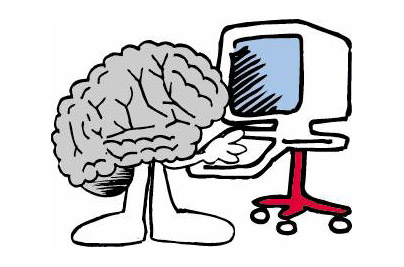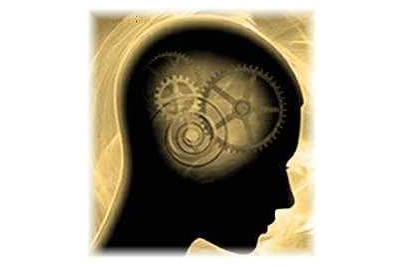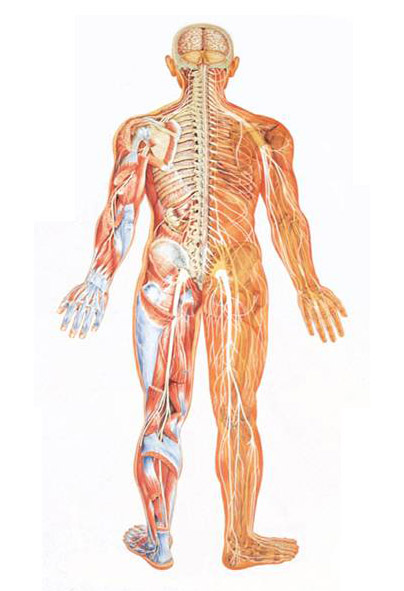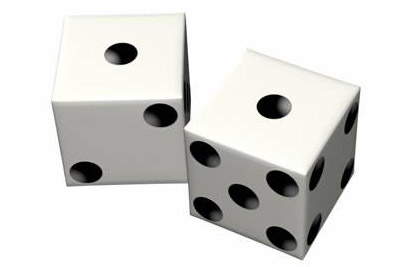9 Brain Habits You Didn’t Realize You Had…
Brain is certainly the most amazing part of human body. It becomes more interesting when it does not work the way you expect it should. Psychology frequently establishes our intuitions about how human mind works, but it reveals a number of surprises as well…
Although some psychology students will have heard one or two of these before, here’s a list of brain habits you probably didn’t realize you had:
1) The maximum capacity of your short-term memory is seven.

Humans have basically three forms of memory: Sensory, Long-term and Short-term. Long-term memory is just like hard-drive space. Similarly, Short-term memory functions like a very small RAM. This Short-term memory is capable to hold only about five to nine (seven is an average) items at a time.
Retrieving information longer than this will need you to either pack it together into seven units or store it in Long-term memory. Have you observed that the most phone numbers have only seven digits?
2) The most visible color is Chartreuse.

Yellowish green, chartreuse, is naturally placed right in the middle of the frequencies of visible light. Human eyes have receptors for green, blue and red colors. Being placed in the middle, chartreuse actuates the most of these receptors to fire, making it distinct and easier to spot. For the same reason, in some metropolises, firetrucks have been modified from red to a yellowish green color to make them more visible and obvious to the eye.
3) Subconscious is smarter than you.

Subconscious is smarter than you. In other words, it is more powerful. In a recent study, a square was attributed to a location on a computer screen through a complex pattern. After watching it out, people began to get results better than the chance of recognizing where the square would crop up next. However, when they were inquired to consciously find out the pattern, even given a few hours, nobody really did it!
4) There are two nervous systems.

We have two sets of nervous systems. One controls excitation, while the other controls inhibition. If you hold out your hand, you might observe minor tremors. This is actually stimulated by slight, random differences in the amount each of the two systems are firing.
5) Brain is exceptionally bad at probability.

Your high-school math teacher might have told you about this one. Here what’s interesting isn’t that your brain is bad at probability. But how? In one study, recipients were asked:
Jessica is 31 years old, single, candid, and very promising. She graduated in philosophy. As a student, she was anxious about discrimination issues and social justice, and also took part in anti-nuclear demonstrations.
Assign a rank to the following statements from most probable to least probable: Jessica is a teacher in an elementary school.
- Jessica works in a bookstore and takes Yoga classes.
- Jessica is active in the feminist movement.
- Jessica is a psychiatric social worker.
- Jessica is a member of the League of Women Voters.
- Jessica is a bank teller.
- Jessica is an insurance salesperson.
- Jessica is a bank teller and is active in the feminist movement.
Nearly 90% of students responded that #7 was more probable than #5. This is despite the fact that to be a bank teller and in the feminist movement is entirely contained within the set of #5 (just being a bank teller). It is observable that our minds like to think more details make events more probable, not less.
6) Memory isn’t great either.

Research has revealed that people are highly probable to misremember past events. Even worse, it is quite easy to suggest a memory that never happened. Due to this fact, so-called “repressed” memories should be given a lot of consideration. It is extremely easier to suggest a memory of a situation that never encountered, than it is to recover one that actually did.
7) Depth is perceivable with one eye.

It’s not quite true that depth perception is totally the result of having two eyes. Binocular vision does help in making a three-dimensional image. Still, most of your capability to perceive depth comes from inside your brain. It has been wired to look at angles and proportions to measure distance.
If you needed two eyes to perceive depth, then most optical illusions wouldn’t work and it would be extremely difficult to gather information from two-dimensional images. Not to mention a great number of one-eyed pirates walking overboard.
8 ) Long-term memory closes up during sleep.

The components of the brain that carry information to Long-term memory turn off while sleeping. For the same reason, dreams quickly fade out after you wake up. Although you may have quite a few dreams in a night, they aren’t being memorialized into Long-term memory. Normally only the fragments of a dream left in Short-term memory have a possibility to be converted after you wake up.
9) The Brain has an amazing instant playback feature.

The last form of memory, i.e. Sensory memory is actually your brain’s equivalent to an instant playback feature. Functioning for both your vision and hearing, your thalamus can resend signals a few seconds after they were originally sent.
Let’s suppose being at a party and overhearing someone call your name. Often you can recall what they said even if you were concentrating on another conversation. This is because your sensory memory re-sends the signals when it feels something important, such as your name. If you missed this form of memory, activities such as multitasking or taking notes from a speaker would not be practicable for you.
If you’re supposed to repeat something you just said because the other person wasn’t hearing, just wait for a few seconds. Often they can replay the message in their head and cause to a reaction.
















October 24th, 2008 at 3:29 pm
i never thought that it actually took only one of your eyes to be able to see with depth perception. Very Interesting article and have certainly been enlightened by it.
October 25th, 2008 at 5:43 pm
“Although you may have quite a few dreams in a night, they aren’t being memorialized into Long-term memory.”
This is clearly not true. I can still remember dreams I had thirty years ago in great detail. Oh, and it´s “memorised” by the way.
October 26th, 2008 at 4:06 am
“Long-term memory closes when you sleep”
Is this really true? Maybe.
October 26th, 2008 at 5:38 pm
Ref. #2, “Chartreuse”. Back in the late 60′s, Coventry (England) re-painted all their fire engines very bright yellow, a colour specifically designed by Lanchester college physics department, because it always showed up as the same colour under any type of street lamp. It was a scary, unmissable colour that seemed to glow even in daylight. The firemen were told not to look at it when cleaning the machines as it would give them a headache or worse. Not unlike chartreuse, but more yellow and much, much brighter. It didn’t last as the powers that be declared that fire engines must always be red. It was an interesting experiment and interesting in this context also.
October 26th, 2008 at 6:21 pm
“Let’s suppose being at a party and overhearing someone call your name. Often you can recall what they said even if you were concentrating on another conversation. This is because your sensory memory re-sends the signals when it feels something important, such as your name.”
I’m not so sure about sensory memory “resending” the original sensory signals to remind you that your name was call. I think it makes more sense to say that the brain stores an alert in your short-term memory associated with your name being called. This alert can be remembered and resent for up to a minute, which is more feasible than the few seconds provided by sensory memory.
October 26th, 2008 at 9:05 pm
Very interesting. Thanks.
October 27th, 2008 at 2:09 pm
what about brain on drugs…………?
October 27th, 2008 at 3:07 pm
The fact that phone numbers have seven digits is moot, what about when phones only had three digits. It has to do with population, memory had zip to do with it.
October 27th, 2008 at 6:31 pm
Well Good blog, but i dont think you did enough research about colors.Im radiobiologist and working about colors also.Mixed colors doesn’t necessarily give more input.
Check Colors Theories.
Greetings.
October 31st, 2008 at 8:55 am
Thanks for the great article
October 31st, 2008 at 10:11 pm
To anyone who has an issue with #2 and especially Cojon since he felt the need to mention he was a psychology professor as well as be snide about the ‘truths’ printed here.
Every word of #2 is 100% truthful. We may be psychologically trained via our environment, society, etc to -respond- better to red, blue or any number of other colors as far as grabbing our attention goes, but this is not what the poster claimed.
If you reread his first line, he states that “The most visible color is Chartreuse.” That is a quantifiable fact. You can actually measure what spectrum is visible to the human eye and whichever color has the most overlap between the three types of receptors is the “most visible color”. Not the most noticeable, not the one we’re trained to react to or look for, just the most visible.
Thankfully, I believe most people already realized this. /rant
November 1st, 2008 at 4:59 pm
#9 is an eye- (and ear-) opener!
November 3rd, 2008 at 5:05 am
I have some issues with this stuff. I will take each in order.
1) The mind is capable of handling as many things as needed to survive. This is what is referred to as multi-tasking. The only reason phone numbers HAD 7 digits is because more were not needed. Last I checked, you need the area code to make a local in many cities. My city requires use of all 10 digits in order to make a call.
2) That is not chartreuse. Chartreuse is a variant of yellow. That stripe, which is clearly Photoshopped, is GREEN. Neither yellow or green are exceptionally visible. As a matter of fact, they are the least visible colors. That is why emergency lights are red and text is black.
3) This one is not even about the subconscious mind. It sound more like psychic abilities, which, while plausible, have never been to exist.
4) The author has mislabeled the voluntary and involuntary nervous responses. The two “systems” are simply parts of the same whole. The author might just as well have said the sewer and drinking water systems are separate.
5) Everything we do is about probabilities. Human communication requires probability in order to function correctly. Human beings predict with roughly 80% accuracy what the other person will say BEFORE they say it. That is probability. Just like the author will PROBABLY disagree with me on this point.
6) MOST people remember things just fine. The only time when memory truly fails a person is during a traumatic event or in old age. This is because adrenaline disrupts the function of memory since the energy is required elsewhere. The analogy is when you start your car, the radio cuts off until the car has started. It is bad analogy, I know.
7) This is true for me, but MOST people required BOTH eyes in order to perceive depth. If this were not so, humans and all other animals would have only one eye. Nature is highly efficient. Nothing is done without reason for long. The reason humans have two eyes, two ears, two arms, two hands, two legs, and two feet is because those things have become the optimal arrangement.
 Long-term memory is never inactive. I remember having a dream before. They are called recurring dreams. Many people have recurring dreams. Some even have recurring nightmares. The reason you do not always remember your dreams is simply because they are the realm of your subconscious mind. Your long-term memory does not need to remember them as they were never outside of your mind. To use computer terminology, dreams are like the firmware. They exist as process needed to occupy one of your components that cannot be shut down completely. Also, memories are placed in long-term memory as soon as they completely processed by the mind. They are only dumped when they do not need to be retained.
Long-term memory is never inactive. I remember having a dream before. They are called recurring dreams. Many people have recurring dreams. Some even have recurring nightmares. The reason you do not always remember your dreams is simply because they are the realm of your subconscious mind. Your long-term memory does not need to remember them as they were never outside of your mind. To use computer terminology, dreams are like the firmware. They exist as process needed to occupy one of your components that cannot be shut down completely. Also, memories are placed in long-term memory as soon as they completely processed by the mind. They are only dumped when they do not need to be retained.
9) Sensory memory is a form of long-term memory. It is how you can ride a bicycle even after years of not doing so. Sensory memory has nothing to do with hearing your name called out at a party.
November 4th, 2008 at 4:13 am
lol – To Sasha… Chartreuse by most definitions is a shade between yellow and green if you want to look it up in any dictionary. It’s kinda funny that you justified your problems with this website in the exact same manner as the person who wrote the list, but somehow you seem to think what you’re saying is more valid. And what you said about the nervous system is not entirely correct. There are many branches to the nervous system which control different parts of the body according to their function and also anatomical position in relation to how they branch off the central nervous system. The ‘involuntary’ and ‘voluntary’ systems are part of the same whole, but they control/ are controlled by different things. I’m not even sure what point you were trying to make with the sewage thing…
Btw, I loved this list! I dunno how accurate everything is without any references, but it’s still an interesting way of thinking of things.
November 5th, 2008 at 6:52 pm
i remember my dreams every night and yesterday i had 2 lol
November 6th, 2008 at 9:26 pm
Sent #9 to my wife. Bitch won’t stop repeating everything she shouts if I don’t respond in 0.5 milliseconds.
November 7th, 2008 at 10:51 pm
thats odd. i remember dreams ive had 10 years ago.
November 9th, 2008 at 9:46 am
Interesting list, although most of those things are knows, It’s nice to read all of them in one place, with short, clear description.
November 9th, 2008 at 2:50 pm
Sasha, im covering my left eye. I can still perceive depth
November 9th, 2008 at 5:41 pm
Such an amazing article. Thanks
November 11th, 2008 at 11:16 am
In the ’7 items’ bit, what exactly constitites ‘an item’ and how is it represented in the brain? What is the diference between say remembering 7 diferent names or 7 numbers in a sequence?
Nice post, worth the neurons!
Steve
November 12th, 2008 at 6:03 am
Yeah…Definitely not two nervous systems. The one nervous system is divided into the Central nervous system and Peripheral nervous system. From there, the PNS is divided into Autonomic and Somatic. The Autonomic is divided into the sympathetic and parasympathetic. All of these have different specializations and pathways, none of which are strictly inhibitory and excitatory unless you are talking about spinal reflexes which don’t even involve the brain.
November 12th, 2008 at 6:47 pm
“Subconscious is smarter than you”
Yes, but I’m glad we don’t live there.
November 15th, 2008 at 1:50 pm
re: #1: phone numbers & seven slots
The seven slots refer to peoples’ typical capacity for counting an array of similar objects on sight. Try it out: ask your friend to draw a random number of dots in a line and then guess how many there are in the shortest time possible… You’ll find that it’s quite hard to go above 7 dots.
This limitation is why we break down long strings of digits (phone numbers, ISBN, bar codes, etc) into smaller chunks. You’ll probably find in the above example that you count 7 dots as a a group of 3 and a group of 4!
November 16th, 2008 at 1:58 am
memorialized?????
November 16th, 2008 at 4:57 pm
Thanks for the article
November 19th, 2008 at 4:15 pm
If long term memory is turned off while asleep, why does sleep learning, listening to hi speed tape recordings while sleeping, have a degree of success? Is the L.T. Memory only off during during periods of non-REM sleep or the opposite or both? In my studies there seems to be quite a bit of differing opinions about this.
November 19th, 2008 at 6:31 pm
I dunno about the example used in number 5. Just based on that, I think people are just bad at probability.
November 20th, 2008 at 2:16 am
I think I liked it, but my excitation nervous system interrrupted my short term memory and I am feeling very sleepy.
November 20th, 2008 at 2:14 pm
Whoa! Some nice ones.
November 21st, 2008 at 3:39 pm
so interesting!!! i always wondered why my hands tremble often. Now i know!!
November 22nd, 2008 at 10:52 pm
I specificly enjoyed the part that says that short term memory turns off when we sleep.. It happened to me sometimes to wake up in the middle of the night and be completly disorientated for some seconds – Like the brain is loading its OS :p
November 25th, 2008 at 5:33 am
wow! very nice article here. i never expected our brain could be this delicate.
November 25th, 2008 at 7:21 am
Thanks.
November 27th, 2008 at 5:13 pm
freaking awesome article.

November 28th, 2008 at 5:52 pm
I love this type of information, I know there is so much we can’t understand about our world and ourselves yet, thanks for sharing this post!
Have a great weekend!
November 28th, 2008 at 11:58 pm
Wow, that’s pretty cool. 8d
December 3rd, 2008 at 9:50 pm
Wow that last one made perfect sense to me. I’ve said “huh?” to people countless times, then answered their question without them having to repeat it. I thought it was a habit of just responding “huh?”.
December 4th, 2008 at 2:16 pm
Excellent Information
December 5th, 2008 at 5:37 pm
#9 is referred to as “The Cocktail Party Phenomenon” incase anyone is interested on more information involving the minds perception of “important”.
December 5th, 2008 at 9:50 pm
I did the one about probabilities well :-\
December 6th, 2008 at 11:50 am
Really interesting information here and well written. The subconscious mind definitely holds powers that we have yet to fully discover.
December 17th, 2008 at 12:17 pm
wow interesting articles!! thumbs up!!
December 18th, 2008 at 1:39 am
i didnt know about all this thanks for sharing this! such a great explanations!
December 18th, 2008 at 2:27 am
interesting articles about the brain!! thumbs up!!
December 18th, 2008 at 6:49 pm
These are interesting.
Except for the probability one.
Simply offering number 7 suggests that five exists without the ending seven offers.
I call bs on that one.
December 23rd, 2008 at 5:56 pm
Nice theory, except that the “rich” have always relied on the “POOR” AND MIDDLE CLASS to make them rich and keep them that way. If everyone was a rich person, there would be no one to do the work that the “rich” need to make their money. As a pricess once said, “If work was so great, the rich would have taken it all for themselves.” I think what your preaching is “ego,” and me. me. me at all costs. Yes, Phil Knight is rich; but it’s been done on the backs of a whole lot of people who, until the news leaked out, were paid nothing compared to Knight himself. Then sold on a market to people at the highest possible price. This is the story of all rich people everywhere, at any given time. And honestly, white people have been very good at this game, taking other’s resources and spreading the wealth—among themselves. That’s one great thing about the rich–they always pay themselves first–
December 29th, 2008 at 4:13 am
This is very interesting, i .love to read about this kind of stuff!
January 4th, 2009 at 8:02 am
#1 is just absurdly false
during my time at a us military college, we routinely committed dozens of things to short term memory four our daily required knowledge….full menus for the next 3 meals, day counts to major events, watch officers, news articles, etc
in any given morning, i would commit at least 30 individual pieces of data to short term memory in less than half an hour
January 12th, 2009 at 12:04 pm
Funny. Some people say “wha!?” before you’ve even finished a sentence. I always naturally gave them a few seconds before I responded and, after a few seconds, they would normally get what i was saying.
Fascinating.
And Goalielax. If you’re going to remember stuff like that it’s going to be commited to long term memory. Obviously if you don’t refresh this information it dosn’t last as long in long term memory as other things. When they say “short term” they mean very short.